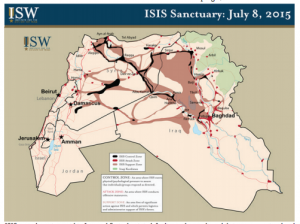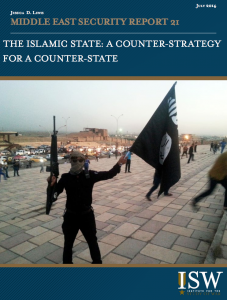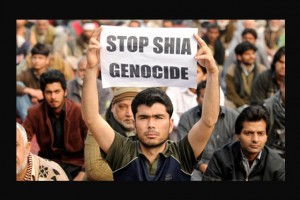Last week, the Western Powers made an historic agreement with Iran to limit its nuclear program in exchange for lifting economic sanctions and allowing Iran to re-connect with the world.
While the agreement faces opposition from the Republican Party in the United States, which will try to block its ratification, and vehement opposition from Israel’s Prime Minister, Benjamin Netanyahu, my guess is that Secretary Kerry and his partners on the Security Council are playing a deeper game.
ISIS Is The Threat!
As stated by former Israeli President Shimon Perez at Davos last year, Israel, is not a material threat to the Arab countries in the Middle East. Since the invasion of Iraq almost 12 years ago, the map of the Middle East has been turned upside down and in my view the biggest threat to peace in the region comes from ISIS or ISIL or DAESH which is its acronym as pronounced in Arabic.
 Taking advantage of the civil war in Syria and the lawlessness in the Sinai and the desserts of Libya, the group challenges the most basic ideas of human dignity and international relations. Reports of their atrocities in the name of Sunni Islam are overwhelming and their fighters do not distinguish between military and civilian targets. There can be no negotiation with such people and their aim is to not only to kill or drive out Yazidis, Christians and Shia but also to overturn the Arab Sunni governments and establish their version of a caliphate across the Arab world.
Taking advantage of the civil war in Syria and the lawlessness in the Sinai and the desserts of Libya, the group challenges the most basic ideas of human dignity and international relations. Reports of their atrocities in the name of Sunni Islam are overwhelming and their fighters do not distinguish between military and civilian targets. There can be no negotiation with such people and their aim is to not only to kill or drive out Yazidis, Christians and Shia but also to overturn the Arab Sunni governments and establish their version of a caliphate across the Arab world.
How to stop them?
The problem is how to stop this movement which is not only ruthless and disregards the lives of the civilian population but also managed to pick up arsenals of heavy military equipment and is developing effective tactics. Even despite tactical air support and extensive direction from U.S. forces, the Iraqi military has, so far, been totally unable to stop them and in Syria, Egypt, and Libya, the group has been able to carry out increasingly bold attacks.
 For a detailed and chilling assessment of ISIS, its goals, ideology, and strategy, I recommend Jessica Lewis’ paper published by the Institute for the Study of War, a U.S. think tank. Ms. Lewis, a former intelligence officer in the U.S. Army, served in Iraq and Afghanistan and brings a comprehensive, perspective to the challenge poised by ISIS which is about both military victory and also ruthless social control and governance.
For a detailed and chilling assessment of ISIS, its goals, ideology, and strategy, I recommend Jessica Lewis’ paper published by the Institute for the Study of War, a U.S. think tank. Ms. Lewis, a former intelligence officer in the U.S. Army, served in Iraq and Afghanistan and brings a comprehensive, perspective to the challenge poised by ISIS which is about both military victory and also ruthless social control and governance.
The problem as I see it, is that the United States and its allies do not have the public support for a prolonged invasion and occupation of Iraq and Syria and the Arab States also do not appear ready to commit their own forces to defeat ISIS even if they were invited to do so by the Shia led Iraqi government. It may be difficult for the Sunni monarchies to convince their own people that the destruction of ISIS is worth the human and economic cost while ISIS claims to represent a pure commitment to Sunni ideals.
Besides tiny Kurdistan, which is still technically part of Iraq, the only regional player which has the combination of ruthless determination and military capacity to seriously face up to ISIS is Iran. Iran has, of course, been supporting the Iraqi government and the Shia militias since the beginning of the conflict but perhaps could do more to check ISIS’ advance and maybe turn it back.
My guess is that the deeper motivation for the nuclear deal with Iran is to open the door for more cooperation with it in the fight against ISIS.
Dangerous times
 Another point of view is that the deal with Iran will actually help ISIS by feeding the claims that the U.S. and the West are backing the Shia in their millennial fued against the Sunnis. Tensions between Shia and Sunni are high not only in Iraq and Syria but also in Yemen where the Iranian backed Houthi rebels continue to battle a Sunni coalition led by Saudi Arabia as discussed a few weeks ago.
Another point of view is that the deal with Iran will actually help ISIS by feeding the claims that the U.S. and the West are backing the Shia in their millennial fued against the Sunnis. Tensions between Shia and Sunni are high not only in Iraq and Syria but also in Yemen where the Iranian backed Houthi rebels continue to battle a Sunni coalition led by Saudi Arabia as discussed a few weeks ago.
In her analysis, Ms. Lewis contends that an increase in sectarian strife only helps re-en¡force ISIS’ message and opposition must come from the Sunni tribes. The only way I can see that happening is if the Sunni tribes are promised an autonomous region of their own such as the Kurds have created in the North. As I wrote a little more than a year ago, it is time to face facts and partition Iraq as I do not think the Sunni tribes will risk their own lives for a Shia dominated government in Baghdad.
If however, this resistance does not materialize or is not successful, then the West will need a plan B and it seems to me that Iran is it. For the oil for which our economies are still dependent to continue to flow, the West needs stability in the region. ISIS will bring anything but. As an ancient Arab proverb says, the enemy of my enemy is my friend and perhaps Iran, which was yesterday’s danger, is tomorrow’s best option. Maybe it will be better to have a kind of Shia – Sunni cold war in the region then allow ISIS to blow everything up.


Hi Mike ,
This is very interesting article and I am pleased to know that you are passionate about about this agreement which opens up many opportunities within the region. I think we all know that Iran and the US are cooperating both in Iraq and Afghanistan and this relationship can only grow as a result of this agreement. By the way, I presume that the proverb ” the enemy of my enemy is my friend ” was popularized in politics by Shah of Iran when he referred to Iran’s policy in 1970s.
In the 1970s, I understand Iran was a tacit ally of Israel and an interesting question is to what degree the people of Iran are really behind the policies and rhetoric of their political leaders.
The problem I see is that today is the enemy ISIS but when it defeated appear another, then another and another … The truth is that it is difficult to eradicate.
Thanks for the comment! The issue is to explore the root causes of such movements and then to develop local institutions which are capable of governing. The paper referenced above talks about ISIS having two strengths or centers of gravity. One is their military capability and the other is their ability to govern and exercise social control. Both need to be present and only an effective local government will be able to deal with both of these strengths and thus keep the radicals at bay.
I wish that one day ISIS or any terrorist group will totally eradicate in this world for better and brighter future.